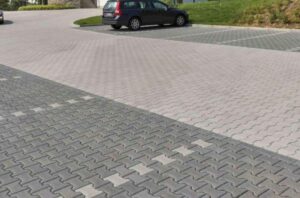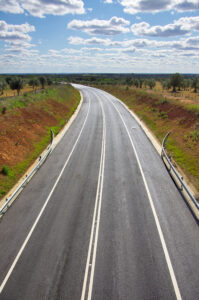How New Jersey’s Climate Affects Asphalt Paving
New Jersey’s weather presents unique challenges for asphalt surfaces. While we enjoy all four seasons, the state’s mix of hot summers, cold winters, and heavy precipitation can take a toll on driveways, parking lots, and roadways.
For homeowners, a cracked driveway isn’t just unattractive—it’s unsafe. For property managers, potholes in a parking lot can create liability risks. And for municipalities, the constant freeze-thaw cycle and heavy traffic can shorten the life of roads.
With over 15 years of experience paving across New Jersey, NJPave understands exactly how our state’s weather impacts asphalt. As a trusted local paving contractor, we’ve built durable, long-lasting pavement solutions tailored to New Jersey’s conditions—from the Shore to the Highlands.
New Jersey’s Climate Challenges for Asphalt
New Jersey’s climate brings everything from humid summer heat to freezing winter storms, creating diverse stresses on asphalt surfaces:
- Freeze-Thaw Cycles: Repeated freezing and thawing in winter cause pavement expansion and contraction, leading to cracks and potholes.
- Snow, Ice & Salt: Frequent snow plowing and road salting add wear and tear, stripping asphalt of its protective layers.
- High Humidity: Summer humidity and rainfall can soften asphalt binders and promote moisture intrusion beneath the surface.
- Temperature Extremes: Temperatures can swing 30°F or more between seasons, stressing pavement structure.
- Heavy Rain & Drainage Issues: From spring showers to hurricane remnants, New Jersey’s rainfall tests drainage systems and base stability.
Unlike arid regions, New Jersey pavements must resist moisture saturation, freeze-thaw cycles, and UV oxidation all in one year. NJPave’s deep local experience ensures we build asphalt designed to perform under these exact conditions.
Heat, Humidity & Asphalt Performance
New Jersey summers can be tough on pavement. High heat, strong sunlight, and humidity accelerate oxidation and softening, which can cause ruts and cracks over time.
Here’s how our state’s climate affects asphalt:
- Oxidation & UV Damage: Extended exposure to sunlight causes asphalt to fade and become brittle, increasing the risk of cracking.
- Moisture Expansion: Humid conditions and summer storms allow water to seep into pavement layers, weakening the base.
- Thermal Expansion: Hot days and cooler nights cause asphalt to expand and contract, creating stress fractures.
- Freeze-Thaw Cracking: Water trapped in cracks expands when frozen, worsening damage every winter.
NJPave combats these effects using polymer-modified asphalt mixes, UV-resistant sealcoats, and precise drainage design to ensure pavement strength year-round.
Installation Challenges in Hot Weather
While warm weather is ideal for paving, New Jersey’s summer heat and humidity require special care.
Our crews take these factors into account:
- Temperature Timing: Asphalt is laid between 250–300°F. We schedule paving during early mornings or late afternoons to avoid the hottest hours.
- Mix Design: NJPave uses asphalt blends that resist rutting and softening in hot, humid conditions while remaining flexible for cold seasons.
- Curing Period: On humid days, asphalt cools more slowly. We allow the proper curing window (often 48–72 hours) before reopening to heavy traffic.
With careful planning and the right mix design, NJPave ensures smooth, compact, and durable asphalt even in peak summer heat.
Cold Weather Considerations in New Jersey
Winter in New Jersey brings freezing temperatures, snow, and ice—each of which challenges asphalt performance and installation.
- Minimum Paving Temperatures: We avoid paving when air or ground temps fall below 50°F. Late spring and early fall offer the best windows.
- Rapid Cooling: In cold weather, asphalt cools too quickly for proper compaction. Our teams coordinate equipment and workflows to work efficiently within the limited time window.
- Warm-Mix Asphalt: For borderline conditions, NJPave uses warm-mix technology, allowing paving at slightly lower temperatures while maintaining workability.
- Freeze-Thaw Protection: We design pavement layers and sealcoats to minimize water infiltration and reduce damage during freeze-thaw cycles.
Even outside the warmest months, paving can succeed in New Jersey when done by experts who understand the timing and materials needed for cold-weather performance.
Moisture & Drainage Challenges
Moisture is one of the biggest enemies of asphalt in New Jersey. Between rainstorms, melting snow, and high humidity, managing water is crucial.
- Dry Base Layers: Paving on a wet base leads to stripping and weak bonding. NJPave ensures all sub-layers are fully dry and compacted before laying asphalt.
- Drainage Design: We grade surfaces carefully to channel water away, preventing ponding and subsurface erosion.
- Seasonal Moisture: From coastal fog to spring rain, we monitor conditions to avoid paving on damp days and protect new asphalt until it cures.
- Sealcoating & Maintenance: Regular sealing prevents water intrusion and extends the pavement’s lifespan by protecting against oxidation and freeze-thaw damage.
Rain and Asphalt Paving in New Jersey
Rain can quickly ruin freshly laid asphalt. NJPave’s crews monitor weather patterns closely to avoid paving during or just before rainfall.
- No Paving on Wet Surfaces: Asphalt must be placed on dry, stable ground—never on wet or frozen bases.
- Rapid Weather Changes: Sudden summer storms can appear without warning. We plan in smaller sections to minimize risk.
- Proper Drainage: Our paving includes precise grading so runoff flows correctly—protecting your investment long-term.
- Preventive Maintenance: We offer crack sealing and periodic sealcoating to protect pavements from moisture damage.
In short, drainage and weather awareness are built into every NJPave project.
Climate-Specific Solutions by Experienced Professionals
New Jersey’s mix of heat, humidity, rain, and cold requires a smart, localized approach. With over 15 years of industry experience, NJPave delivers durable, weather-resistant asphalt solutions built to handle the Garden State’s toughest conditions.
Our approach includes:
- Custom Asphalt Mixes: Tailored binders resist softening in summer and cracking in winter.
- Prepared Crews & Equipment: We use calibrated rollers, compactors, and efficient workflows to ensure top-quality compaction—no matter the weather.
- Strategic Scheduling: Projects are planned for optimal weather windows—spring and fall being the most favorable.
- Thorough Site Preparation: Every base layer is compacted, graded, and tested before paving.
- Protective Maintenance: UV-resistant sealcoating, crack filling, and periodic resurfacing protect your pavement investment.
- Local Expertise: Our teams understand New Jersey’s micro-climates—from coastal humidity to mountain frost—ensuring long-lasting performance statewide.
Proven Results Across New Jersey
From suburban driveways to commercial parking lots to municipal roadways, NJPave’s work stands the test of time. Our projects across the state—from the Jersey Shore to North Jersey—have endured years of heat, humidity, and snow while maintaining strength and curb appeal.
That’s the NJPave difference: craftsmanship, climate expertise, and commitment to quality—built for New Jersey’s roads, communities, and conditions.



